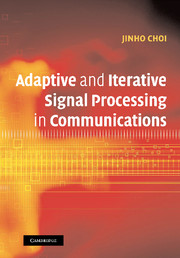Book contents
- Frontmatter
- Contents
- List of figures
- List of tables
- Preface
- List of symbols
- List of abbreviations
- 1 Introduction
- I ISI channels and adaptive signal processing
- II Iterative signal processing for ISI channels
- III Other interference-limited systems
- 8 CDMA systems and multiuser detection
- 9 Iterative CDMA receivers
- 10 Iterative receivers for multiple antenna systems
- 11 Coded OFDM and the iterative receiver
- Appendix 1 Review of signal processing and the Ƶ-transform
- Appendix 2 Important properties of matrices and vectors
- Appendix 3 Background for probability and statistics
- References
- Index
11 - Coded OFDM and the iterative receiver
Published online by Cambridge University Press: 23 November 2009
- Frontmatter
- Contents
- List of figures
- List of tables
- Preface
- List of symbols
- List of abbreviations
- 1 Introduction
- I ISI channels and adaptive signal processing
- II Iterative signal processing for ISI channels
- III Other interference-limited systems
- 8 CDMA systems and multiuser detection
- 9 Iterative CDMA receivers
- 10 Iterative receivers for multiple antenna systems
- 11 Coded OFDM and the iterative receiver
- Appendix 1 Review of signal processing and the Ƶ-transform
- Appendix 2 Important properties of matrices and vectors
- Appendix 3 Background for probability and statistics
- References
- Index
Summary
Orthogonal frequency division multiplexing (OFDM)was proposed in the 1960s (see Chang and Gibbey (1968)) and has been actively investigated since then. It can be used for both wired and wireless communications, providing several attractive features. One important feature of OFDM is that it is ISI-free. In OFDM, data symbols are transmitted by multiple orthogonal subcarriers. Each signal transmitted by a subcarrier has a narrow bandwidth and experiences flat fading without interfering with the other subcarriers' signals. From this, a simple one-tap equalizer can be used in the frequency domain to compensate for fading, while a complicated equalizer is required in a single-carrier system to overcome ISI.
It is generally known that OFDM will not outperform single-carrier systems (in terms of the average BER) when a single modulation scheme is used for all subcarriers. However, OFDM can offer a better performance if adaptive bit loading is employed. Since each subcarrier may experience different fading, the SNR varies among the subcarriers. A different number of bits per symbol can be transmitted using a different modulation scheme across subcarriers depending on the SNR for each subcarrier. For example, subcarriers with low SNR may transmit no signal or may use a lower-order modulation to stay below a certain BER ceiling, while more bits per symbol can be transmitted through subcarriers with high SNR. This approach of adaptive bit loading is used for wired communication systems (Bingham, 1990). Indeed, adaptive bit loading allows OFDM to outperform single-carrier systems. However, in some wireless communication systems, including digital terrestrial TV broadcasting, adaptive bit loading becomes impractical to implement in compensating for different fading across subcarriers.
- Type
- Chapter
- Information
- Adaptive and Iterative Signal Processing in Communications , pp. 271 - 289Publisher: Cambridge University PressPrint publication year: 2006



